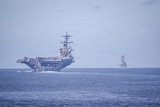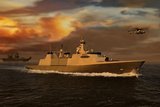Bretagne completes first sea trials
The French Navy’s FREMM multi-mission frigate Bretagne has successfully completed first sea trials in Lorient, North-Western France, the International Organization for Cooperation on Arms (OCCAR) has announced.
During the trials, performance of the frigate’s propulsion and navigation systems was tested. Further tests and trials of various systems, including the combat management system, are scheduled to take place over the coming weeks.
Bretagne will be France's fifth anti-submarine warfare frigate, and is due to be delivered to the French Navy in mid-2018. Four FREMM frigates have been delivered to the French Navy, and three other ships are at different stages of assembly and construction at Naval Group Lorient shipyard.
The FREMM frigates are equipped with advanced systems, including the Héraclès multifunction radar, naval cruise missiles, Aster and Exocet MM40 missiles and MU 90 torpedoes.
Related Equipment in Defence Insight
More from Naval Warfare
-
![UK’s Fleet Solid Support ship programme deemed on track despite steel supply concerns]()
UK’s Fleet Solid Support ship programme deemed on track despite steel supply concerns
Shipbuilders are saying the programme is going ahead on time as the government estimates 7.7 million tonnes of steel are needed for 2026 infrastructure projects.
-
![As Indonesia doubles up its order, who else is looking at the Arrowhead 140 frigate design?]()
As Indonesia doubles up its order, who else is looking at the Arrowhead 140 frigate design?
The adaptable design of Babcock’s Arrowhead 140 frigate, already selected by the UK Royal Navy and Poland, has led to more orders from Indonesia while other countries continue to weigh it up.
-
![US Navy to invest more than $700 million in laser-related R&D efforts in FY2026]()
US Navy to invest more than $700 million in laser-related R&D efforts in FY2026
The US Navy’s acceleration of its laser weapon development initiatives reflects a decisive shift towards ultimately having a “laser on every ship” across tomorrow’s surface fleet.





















